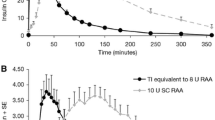Abstract
Inhaled insulin is a recent advance in insulin delivery that promises to be an effective alternative to subcutaneous insulin. Several insulin delivery systems are currently in development and the first of these has been approved for clinical use. Inhaled insulin offers greater flexibility and convenience for patients with diabetes and may be particularly useful in those who are reluctant to initiate or intensify insulin treatment. Although promising, potential concerns remain regarding its long-term effects on lungs. Also, excluding certain groups of patients such as smokers and those with respiratory illnesses will restrict its use at present. Lack of familiarity with the technology, especially relating to dose adjustments and inhaler device, is also likely to present fresh challenges. But, careful selection of patients, education, and continued support from health professionals is vital to ensure success with this new technology.
Similar content being viewed by others
References and Recommended Reading
Hunt LM, Valenzuela MA, Pugh JA: NIDDM patients’ fears and hopes about insulin therapy. The basis of patient reluctance. Diabetes Care 1997, 20:292–298.
Zamanini A, Newson RB, Maisey M, Feher MD: Injection related anxiety in insulin treated diabetes. Diab Res Clin Pract 1999, 46:239–246.
Koro CE, Bowlin SJ, Bourgeois N, Fedder DO: Glycemic control from 1988 to 2000 among U.S. adults diagnosed with type 2 diabetes: a preliminary report. Diabetes Care 2004, 27:17–20.
Owens DR, Zinman B, Bolli G: Alternative routes of insulin delivery. Diabet Med 2003, 20:886–898.
Laube BL: The expanding role of aerosols in systemic drug delivery, gene therapy, and vaccination. Respir Care 2005, 50:1161–1176.
Quattrin T, Belanger A, Bohannon NJ, Schwartz SL: Efficacy and safety of inhaled insulin (Exubera) compared with subcutaneous insulin therapy in patients with type 1 diabetes: results of a 6-month, randomized, comparative trial. Diabetes Care 2004, 27:2622–2627.
Skyler JS, Weinstock RS, Raskin P, et al.: Use of inhaled insulin in basal/bolus insulin regimen in type 1 diabetic subjects: a 6-month, randomized, comparative trial. Diabetes Care 2005, 28:1630–1635.
Defronzo RA, Bergenstal RM, Cefalu WT, et al.: Efficacy of inhaled insulin in patients with type 2 diabetes not controlled with diet and exercise: a 12-week, randomized, comparative trial. Diabetes Care 2005, 28:1922–1928.
Rosenstock J, Zinman B, Murphy LJ, et al.: Inhaled insulin improves glycemic control when substituted for or added to oral combination therapy in type 2 diabetes: a randomized, controlled trial. Ann Intern Med 2005, 143:549–558.
Barnett AH, Dreyer M, Lange P, Serdarevic-Pehar M: An open, randomized, parallel-group study to compare the efficacy and safety profile of inhaled human insulin (Exubera) with glibenclamide as adjunctive therapy in patients with type 2 diabetes poorly controlled on metformin. Diabetes Care 2006, 29:1818–1825.
Barnett AH, Dreyer M, Lange P, Serdarevic-Pehar M: An open, randomized, parallel-group study to compare the efficacy and safety profile of inhaled human insulin (Exubera) with metformin as adjunctive therapy in patients with type 2 diabetes poorly controlled on a sulfonylurea. Diabetes Care 2006, 29:1282–1287.
Hollander PA, Blonde L, Rowe R, et al.: Efficacy and safety of inhaled insulin (Exubera) compared with subcutaneous insulin therapy in patients with type 2 diabetes: results of a 6-month, randomized, comparative trial. Diabetes Care 2004, 27:2356–2362.
Davis TM, Davis WA: An assessment of eligibility for inhaled insulin (Exubera): the Fremantle Diabetes Study. Diabetes Care 2007: 30:360–361.
Himmelmann A, Jendle J, Mellen A, et al: The impact of smoking on inhaled insulin. Diabetes Care 2003, 26:677–682.
Becker RH, Sha S, Frick AD, Fountaine RJ: The effect of smoking cessation and subsequent resumption on absorption of inhaled insulin. Diabetes Care 2006, 29:277–282.
Europe Medicines Agency: EU Summary of Product Characteristics for Exubera. Available at http://www.emea.europa.eu/humandocs/PDFs/EPAR/exubera/H-588-PI-en.pdf. Accessed May 31, 2007.
Henry RR, Mudaliar SR, Howland WC III, et al.: Inhaled insulin using the AERx Insulin Diabetes Management System in healthy and asthmatic subjects. Diabetes Care 2003, 26:764–769.
Skyler JS, Jovanovic L, Klioze S, et al.: Two-year safety and efficacy of inhaled human insulin (Exubera) in adult patients with type 1 diabetes. Diabetes Care 2007, 30:579–585.
Goldman MD: Lung dysfunction in diabetes. Diabetes Care 2003, 26:1915–1918.
Hsia CC, Raskin P: The diabetic lung: relevance of alveolar microangiopathy for the use of inhaled insulin. Am J Med 2005, 118:205–211.
McElduff A, Mather LE, Kam PC, Clauson P: Influence of acute upper respiratory tract infection on the absorption of inhaled insulin using the AERx insulin Diabetes Management System. Br J Clin Pharmacol 2005, 59:546–551.
Fineberg SE, Kawabata T, Finco-Kent D, et al.: Antibody response to inhaled insulin in patients with type 1 or type 2 diabetes. An analysis of initial phase II and III inhaled insulin (Exubera) trials and a two-year extension trial. J Clin Endocrinol Metab 2005, 90:3287–3294.
Author information
Authors and Affiliations
Corresponding author
Rights and permissions
About this article
Cite this article
Bellary, S., Barnett, A.H. Selection and education of patients for inhaled insulin. Curr Diab Rep 7, 363–368 (2007). https://doi.org/10.1007/s11892-007-0059-6
Published:
Issue Date:
DOI: https://doi.org/10.1007/s11892-007-0059-6




